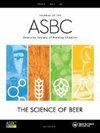啤酒花衍生的水性代谢产物预处理工业管道减少短乳杆菌的生物污垢
IF 1.8
4区 农林科学
Q4 BIOTECHNOLOGY & APPLIED MICROBIOLOGY
Journal of the American Society of Brewing Chemists
Pub Date : 2021-09-03
DOI:10.1080/03610470.2021.1952852
引用次数: 0
摘要
微生物生物膜可以在啤酒厂内的许多区域建立,暴露于这些生物群落会导致不良风味。啤酒转移系具有特别的污染风险,因为如果它们已经被降解并且没有得到很好的维护,这些转移系为生物膜定植提供了一个有效的成核点。尽管由于长时间使用存在表面缺陷,但在罐装操作中放置几个月的转移管与未暴露于产品的类似管相比,其承载微生物生长的能力显着降低,这表明工业实践本身赋予了新生产线中最初不存在的管道抗菌膜特性。使用体外实验设计来重建管道中的微生物生物污垢,与未经处理的对照组相比,用啤酒人为调节的传输线有效地减少了啤酒花酸抗性微生物短乳杆菌的生物污垢。观察到的微生物生长的减少在高酒精度啤酒的品系中比在中等酒精度啤酒的品系中更为明显。用啤酒花提取物或啤酒花相关萜类化合物水溶液处理的管材也表现出对微生物生长的相对抗性。与未经处理的对照相比,用含有主要(萜烯烃)和次要(氧合萜烯)啤酒花相关萜烯的溶液预处理管材减少了短乳杆菌的生物污染。结果表明,用这些化合物的简单溶液对啤酒管进行调理可以提供一种防止生物污染的方法。本文章由计算机程序翻译,如有差异,请以英文原文为准。
Pre-Treatment of Industrial Tubing with Aqueous Hop Derived Metabolites Reduces Lactobacillus brevis Biofouling
Abstract Microbial biofilms can establish in numerous areas within the brewery and exposure to these communities of organisms can result in undesirable flavors. Beer transfer lines represent a particular risk for contamination as the lines provide an effective point of nucleation for biofilm colonization if they have been subject to degradation and are not well maintained. Despite the presence of surface imperfections associated with prolonged use, transfer tubing in place for several months within a canning operation was observed to be significantly less capable of hosting microbial growth than comparable tubing that had not been exposed to the product, suggesting that the industrial practice itself had imparted an antibiofilm character to the tubing not originally present in new lines. Using an in vitro assay designed to reconstitute microbial biofouling in this tubing, transfer lines artificially conditioned with beer served to effectively reduce biofouling by the hop acid resistant microorganism Lactobacillus brevis compared to untreated controls. The observed reduction in microbial growth was more pronounced in lines that had been conditioned with highly-hopped beer than moderately-hopped beer. Tubing conditioned with aqueous solutions of hop extracts or hop-associated terpenoid compounds also exhibited a relative resistance to microbial growth. Pre-treatment of tubing with solutions containing major (terpene hydrocarbons) and minor (oxygenated terpenes) hop- associated terpenes reduced L. brevis biofouling relative to untreated controls. Results indicate that conditioning of beer tubing with simple solutions of these compounds may provide a means of protecting against biofouling.
求助全文
通过发布文献求助,成功后即可免费获取论文全文。
去求助
来源期刊

Journal of the American Society of Brewing Chemists
工程技术-生物工程与应用微生物
CiteScore
4.00
自引率
20.00%
发文量
41
审稿时长
3 months
期刊介绍:
The Journal of the American Society of Brewing Chemists publishes scientific papers, review articles, and technical reports pertaining to the chemistry, microbiology, and technology of brewing and distilling, as well as the analytical techniques used in the malting, brewing, and distilling industries.
 求助内容:
求助内容: 应助结果提醒方式:
应助结果提醒方式:


